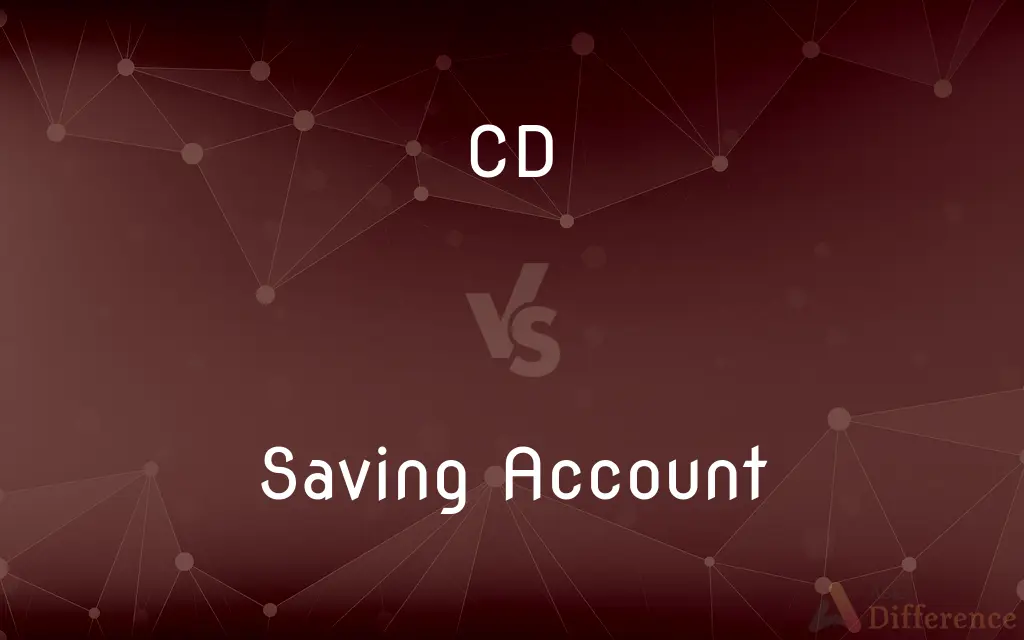CD vs. Saving Account — What's the Difference?
Edited by Tayyaba Rehman — By Fiza Rafique — Published on December 13, 2023
A CD (Certificate of Deposit) is a time-specific deposit with fixed interest, while a Saving Account is a bank account that earns interest and allows withdrawals.

Difference Between CD and Saving Account
Table of Contents
ADVERTISEMENT
Key Differences
A CD, or Certificate of Deposit, is essentially a timed deposit that a person makes with a bank or financial institution. With a CD, the individual agrees to keep a sum of money deposited for a fixed period, and in return, the bank typically offers a higher interest rate than regular savings accounts. On the other hand, a Saving Account is a bank account where one can deposit and withdraw money while earning interest, albeit at a typically lower rate than a CD.
The primary appeal of a CD is its higher interest rate. Since the depositor agrees not to withdraw the funds for a predetermined period, the bank can offer a more favorable return. In contrast, the liquidity of a Saving Account is its main advantage. Account holders can access their funds when needed, but this flexibility usually comes with a lower interest rate.
It's crucial to consider penalties and restrictions when discussing CDs and Saving Accounts. With a CD, withdrawing money before the term ends often results in a penalty, meaning the depositor might lose some of the interest earned. A Saving Account usually doesn't have such penalties, but may have limitations on the number of withdrawals or transactions allowed per month.
Another distinction lies in the purpose and use of each account type. People often choose CDs as a low-risk investment option, especially when they're sure they won't need the funds for a while. In contrast, Saving Accounts are typically used for emergency funds or money that might be needed in the short term, thanks to their accessibility.
Lastly, both CDs and Saving Accounts are considered safe, especially when they're with institutions insured by the Federal Deposit Insurance Corporation (FDIC). However, their suitability depends on individual financial goals, the need for liquidity, and the desired return on investment.
ADVERTISEMENT
Comparison Chart
Nature
Time-specific deposit
Deposit account with withdrawal flexibility
Interest Rates
Typically higher
Generally lower
Penalties
Penalties for early withdrawal
May have limits on withdrawals, but fewer penalties
Liquidity
Limited; based on term
High; accessible funds
Purpose
Longer-term, low-risk investment
Short-term savings, emergency funds
Compare with Definitions
CD
A financial tool for low-risk, short to medium-term investment.
For her short-term savings goal, a CD seemed the best option.
Saving Account
Used for storing money that may be needed in the short term.
His Saving Account is where he keeps money for unexpected expenses.
CD
A bank product with a fixed term and typically higher interest rates.
She invested in a CD to get a better return over two years.
Saving Account
Allows both deposits and withdrawals with some restrictions.
She transferred money from her checking to her Saving Account.
CD
An agreement between a bank and depositor for a fixed period.
The bank offered him a 1-year CD with an attractive interest rate.
Saving Account
Often comes with online and mobile banking features.
She checked her Saving Account balance on her mobile app.
CD
Often insured by institutions like FDIC up to certain limits.
She felt secure with her CD, knowing it was FDIC insured.
Saving Account
Typically offers lower interest rates than other deposit products.
The interest from the Saving Account was added to her balance.
CD
A time-specific deposit restricting withdrawals until maturity.
The CD matures next month, so he'll access the funds then.
Saving Account
A bank account that earns interest and provides liquidity.
He opened a Saving Account to keep his emergency funds.
CD
The chemical suymbol for cadmium, a metallic element of atomic number 48.
CD
The abbreviation for the candela, the basic unit of luminous intensity adopted under the System International d'Unites.
CD
An acronym for compact disk, a disk-shaped recording of binary data that is smaller than a phonograph record, and is recorded and played back by a compact disk player, an electronic device containing a laser. The term is also used generically to refer to the medium as a data storage medium.
CD
A compact disk player.
CD
An acronym for certificate of deposit, a debt instrument issued by a bank for a fixed time period, usually paying interest.
CD
A soft bluish-white ductile malleable toxic bivalent metallic element; occurs in association with zinc ores
CD
The basic unit of luminous intensity adopted under the Systeme International d'Unites; equal to 1/60 of the luminous intensity per square centimeter of a black body radiating at the temperature of 2,046 degrees Kelvin
CD
A debt instrument issued by a bank; usually pays interest
CD
A digitally encoded recording on an optical disk that is smaller than a phonograph record; played back by a laser
CD
Being one hundred more than three hundred
Common Curiosities
What does CD stand for in banking?
It stands for Certificate of Deposit.
Do Saving Accounts typically have minimum balance requirements?
Some do, but it varies by bank and specific account type.
Can I withdraw money from a Saving Account anytime?
Yes, but some banks may have limits on the number of monthly withdrawals.
Are CDs and Saving Accounts safe?
Yes, especially when with FDIC-insured institutions, up to insured limits.
Is the interest from a CD and Saving Account taxable?
Yes, it's typically considered taxable income.
What happens if I withdraw from my CD early?
There's typically a penalty which might reduce the interest earned.
What are the benefits of a Saving Account?
Liquidity, interest earning, and often no penalties for withdrawals.
Why choose a CD over a Saving Account?
A CD often offers higher interest rates in exchange for locking in funds.
How long are the terms for CDs?
They can range from a few months to several years.
How are interest rates determined for Saving Accounts?
They're set by individual banks, influenced by federal rates and economic factors.
Can I have multiple CDs and Saving Accounts?
Yes, there's no limit to the number you can have.
What should I consider when choosing between a CD and Saving Account?
Consider your need for liquidity, desired return, and time horizon.
Why might someone prefer a Saving Account for emergency funds?
Because of its liquidity and ease of access without penalties.
Can I add money to a CD after opening it?
Generally no, once a CD is opened, you can't add to it.
Do CDs have monthly fees?
Typically no, but always check with the specific bank's terms.
Share Your Discovery

Previous Comparison
Dumplings vs. Wontons
Next Comparison
Blue Collar vs. White CollarAuthor Spotlight
Written by
Fiza RafiqueFiza Rafique is a skilled content writer at AskDifference.com, where she meticulously refines and enhances written pieces. Drawing from her vast editorial expertise, Fiza ensures clarity, accuracy, and precision in every article. Passionate about language, she continually seeks to elevate the quality of content for readers worldwide.
Edited by
Tayyaba RehmanTayyaba Rehman is a distinguished writer, currently serving as a primary contributor to askdifference.com. As a researcher in semantics and etymology, Tayyaba's passion for the complexity of languages and their distinctions has found a perfect home on the platform. Tayyaba delves into the intricacies of language, distinguishing between commonly confused words and phrases, thereby providing clarity for readers worldwide.












































